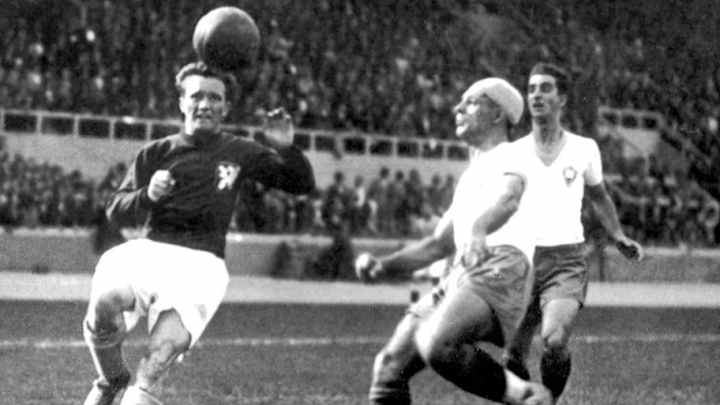World Cup Countdown: 18 Weeks to Go - Remembering the Infamous 'Battle of Bordeaux'

Throughout the decades, everybody can recollect a particularly nasty football match which had its fair share of red cards or crunching tackles. Whether that be the 'Battle of the Bridge' between Spurs vs. Chelsea two years ago, or the carnage witnessed in East London when a game between West Ham and Leeds back in 1999 saw a total of eleven cards brandished between the two sides.
However, at the 1938 World Cup, the inaugural match at the brand new Parc Lescure in Bordeaux has gone down in history as one of football's most brutal ever matches. Brazil faced Czechoslovakia in a quarter-final, but the chaos that followed was remembered more so than the actual scoreline.
#TDIH: 12 June 1938 - Battle of Bordeaux. First time that 3 players were sent off in a #WorldCup match #More2Football pic.twitter.com/oAy4CIopKY
— Sky HISTORY2 (@HISTORY2UK) June 12, 2014
(You may also be interested in'World Cup Countdown: 19 Weeks to Go - Italy's First Triumph Under Benito Mussolini')
Despite the smiles and handshakes before the game between captains Martim Silveira and Frantisek Planicka, the match quickly deteriorated into a ferocious fervour. In the 14th minute, Zeze Procopio of Brazil crunched into Czechoslovakian forward Oldrich Nejedly, and was instantly sent off by referee Pál von Hertzka.
Although Brazil were a man down, they adopted a dogged determination and held their opponents for the opening half hour before taking the lead through a delightful Leonidas finish. The goalscorer would then get injured himself after a horror challenge, but would be able to continue.
The match was disappearing from the clutches of the referee von Hertzka, and his own authority was continuously being undermined by aggression and vitriol from both sides. Skirmishes were continuing all over the field, with brutal fouls being committed by near-enough every player imaginable. Right on the half-time whistle, Brazil's Martim and Czechoslovakia's Jan Riha were sent off after two more disgraceful challenges that would make Vinnie Jones wince. The match had just reached its half-way point, and already three players had been given their marching orders.
(You may also be interested in 'World Cup Countdown: 19 Weeks to Go - Remembering the "Italian Stallion" Giuseppe Meazza')
Both sides then went into their respective dressing rooms and were given time to calm down. From the Brazilian perspective, they only had nine men on the field, but were somehow still winning the game. The message was simple: keep doing what you're doing. For the Czechoslovakians, they knew that with a man advantage, they could make Brazil pay. They just had to wait for their opportunity and not succumb to a game plagued with a barbaric pulse.
Twenty minutes after the restart, Czechoslovakia finally levelled. A Brazilian handball in the box gave the Europeans a penalty, and the previously injured Nejedly stepped up and buried the spot-kick.
Shortly after his penalty however, Nejedly was then hit with another heavy challenge, resulting in a broken leg. Consequently, Nejedly could not play on and Czechoslovakia had to play the rest of the game with nine men. There was only a total of 18 men on the field at this point, and any footballing prowess that had been shown on the pitch had now vanished; all that remained was madness.
As if the game hadn't been tarnished enough with injury, Czechoslovakia's 'keeper František Plánička then suffered a broken arm, but courageously continued to play the rest of match. In a horrible twist of fate however, the shot-stopped who was widely regarded as one of the world's best during the 1930s, would never play another international game after this match, due to his injury. Plánička had reached a record 73rd cap for Czechoslovakia in the 'Battle of Bordeaux', but his battle scars would sadly end his international career.
After a crazy ninety minutes, the game went into extra time after the sides could not be separated. However, with both teams battered and broken, no more goals were scored in extra time.
The game was then replayed two days later, with both teams having to make huge changes to their lineups. Brazil brought in an incredible nine new players, while Czechoslovakia had to bring in six. Brazilian captain Silveira was ruled out through injury, so Leonidas led the South Americans out after recovering just in time.
Brazil would win the game 2-1, but the result of the replay was overshadowed by the anarchy witnessed in the initial tie. A record three red cards were issued, a feat that would only be beaten nearly 70 years later in 2006 in a game between Portugal and the Netherlands.
The 'Battle of Bordeaux' has been remembered as one of football's most brutal games ever, and the severity of the injuries in the match meant that some players would never play international football ever again. Another casualty was that of referee von Hertzka, who would also never referee an international match ever again due to his lax officiating.
1938 was the last World Cup before World War Two, but even a year before war broke out, a fierce battle had already taken place on a football pitch in Bordeaux. The violence witnessed during the game makes it memorable as a dark day in football, and hopefully, one that will never be repeated in the future.
